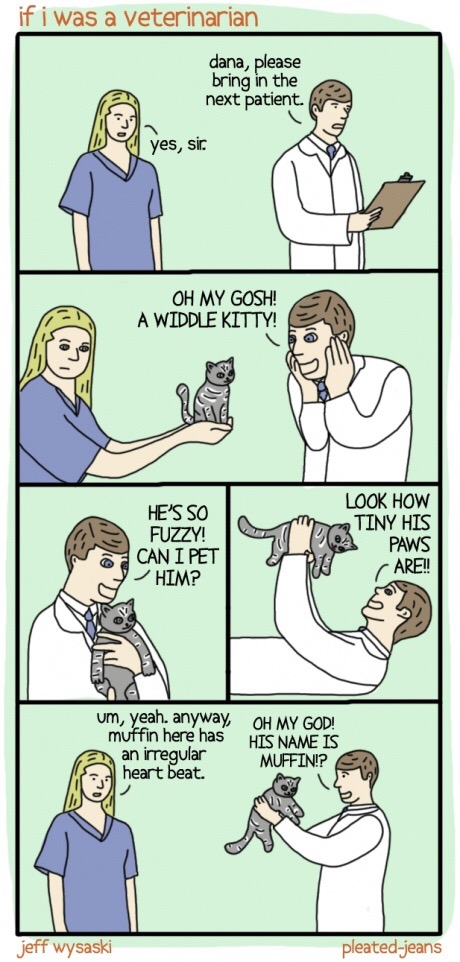Throughout our veterinary education, we’re all taught about the importance of ‘managing expectations’ of our clients.

The plethora of prime-time TV shows like ‘Supervet’ can sometimes give clients an unrealistic view of what’s possible in first opinion practice (and not least in budget!), so the best way to keep everyone happy is to be realistic, discuss what’s involved in your plan, and, if appropriate, the relative benefits of referral. After all, nobody enjoys that moment when you proudly discharge a dog following a successful FHNE, only to have the owner ask what the ‘implants’ are made of.
So my question is why don’t we have these kind of discussions with ourselves? If we understand that clients with unrealistic expectations can never leave satisfied and happy, how do we expect ourselves to be satisfied and happy in our careers?
Getting into vet school is hard. Really hard. There are so many other equally intelligent, caring and enthusiastic applicants that we spend our summers doing anything to prove we want it more than anyone else. One of the things that sets veterinarians apart from, let’s say, an accountant executive for a mid-tier publishing company, is that people assume you’ve wanted to do it since you were born! We’re taught from the start that if you want a place, you better believe you’ve been destined for veterinary greatness ever since you saved that baby bird from drowning in the pond at your fifth birthday party.
“Did you always want to be a vet?” We’ve heard it a million times. Personally, I did a degree and a masters in Marine Biology first – fifteen year old me didn’t think I was cut out for five years of vet med. THERE! I’m doing it even now, making excuses. Why is it not ok just to say “No”?
Our childhood aspirations bear little relevance on our competency as a vet or vet nurse so why does the idea of us admitting that it’s actually just a job make Mrs Chance clutch Snowflake to her chest and request the other vet quicker than you can say ‘anal glands’?
Now for many of us, we really did rescue that baby bird. And that’s amazing! But even then not every day of your career is going to live up to the “all creatures great and small” dream.
You WILL get shouted at by clients, AND by your boss. You WILL make the wrong call and it WILL be your fault. You WILL miss something on that x-ray, or even that ex-lap! You WILL have days where every patient that steps foot in your exam room has a terminal illness, and you WILL have to explain to your clients that there is nothing you can do.
Regardless of how hard you’ve dreamt of being a vet, or how much you usually enjoy your job, there will be days where you find yourself praying for a day full of puppy vaccines so you don’t have to think too hard. And that’s ok!

Being honest with ourselves about that doesn’t make us worse at our job. It doesn’t make us care less or try less hard. But it does make you feel less guilty when it happens.
Google ‘what’s it like to work in veterinary medicine’ and before you get to the end of page one you’ll be seeing words like “burnout” “imposter syndrome” and “suicide”. And that’s not alright. It’s not right to be in a profession where over half of us feel inadequate. It’s not right to feel like your failing on a daily basis. And it’s not right to pile so much pressure on yourself to have the ‘best job in the world’ that you can’t admit when you’re having shitty day… or week…or more.

So what’s the answer?
Personally, I think the change starts with us. We have to be honest with ourselves about what our careers can offer us and what they should mean to us. Managing our own expectations in order to be satisfied in our careers is no different than what we do with our atopic dogs or FLUTD cats – alot of the time it’s going to be great, but there will be lapses from time to time so you can’t beat yourself up for it!
I’m no expert, and I’m far from practicing what I preach 100% of the time, but here are some things I’ve learned so far:
1. Spend at least an hour a day doing something non-work related.
I adore being a vet (although I know it probably doesn’t sound that way!) and I honestly think it’s the best fit for my career that I could possibly have found, but at the same time I enjoy hobbies and friends outside of the vet world and that’s important too. Take time for yourself… And here’s the hard part… DON’T feel guilty about it! Read a novel instead of journal articles before bed each night! Binge watch that season of Homeland! Take up a sport or an art and you’ll find it so refreshing to spend time bettering yourself at something purely for fun! I find nothing clears my mind better than trying not to fall off a surfboard or a horse, or contorting myself into unnatural positions on a yoga mat for a few hours!
2. Have non-vet friends! Gasp!
At vet school you make friendships that last forever. Nothing cements a relationship like the thrill of calving your first cow together or scrubbing into your first big op on surgical rotation. But our tendency to ‘talk shop’ can detract from point 1. Having friends with different interests brings variety and when your work does come up, chances are your non-vet friends will think what you do sounds pretty cool so and can give you a nice confidence boost to boot!
3. Talk openly with your vet friends– Sharing the bad times as well as the good ones
We’ve all been there. You’re having a catch up with the old gang and everyone’s excitedly swapping stories of their latest surgical success or medical mystery. Sharing our successes with our colleagues and friends is important and fun, but when was the last time you brought up that spay didn’t go right, or the anaesthetic accident that shouldn’t have happened but did. When was the last time you admitted that you don’t enjoy your job sometimes? What are your friends going to do if you start the conversation? Judge you? Unfriend you on facebook? Run to the RCVS? Chances are, if you start sharing your lowest moments your friends will join in with their own.
According to the latest stats from VetFutures.org, vet students are 1/3 less likely to discuss mental health issues with others than the general population – that’s 75.5% of vet students hiding an issue that affects 1 in 4 people. And when 38.7% of those vet students are having suicidal thoughts that’s a HUGE problem! Discussing our failures and weaknesses and reflecting on how to avoid them next time not only makes us better vets, but it’s a great form of catharsis! When we’re all honest and share the bad as well as the good it helps everyone remember that we’re only human, and we’re all always learning, and we’re all in it together.
4. Seek help when you need it
I’m no counsellor or psychiatrist, but there are plenty of people that are that want to help you. Mental health awareness in the veterinary field has soared in recent years as worrying statistics like those I touched upon above have become better known. Reach out and use them and you might just find yourself happier in both your career and personal life.
If you’re having concerns about your career or future try the Vet Helpline at http://www.vetlife.org.uk/
Check out the RCVS and BSAVA mind matters initiatives http://www.rcvs.org.uk/news-and-events/news/mind-matters-initiative-new-veterinary-mental-health-and/
https://www.bsava.com/Education/CPD/Mind-Matters
The Royal Veterinary College CPD unit has an upcoming online webinar plus series on “professional and non clinical skills” which includes challenging notions of ‘success’ http://cpd.rvc.ac.uk/courses/webinar-plus-professional-and-non-clinical-skills-–-what-are-they-and-how-can-they-make-me-a-better-vet
Even check out these free webinars from VetMindMatters and The Webinar Vet! http://www.vetmindmatters.org/from-mind-full-to-mindful-with-series-of-stress-reduction-webinars/
5. One final thought… Maybe it’s time to redress the boundaries about what ‘being a vet/vet nurse’ means
Does ‘being a vet’ mean that every day has to be something out of a children’s story? No – we all have bad days and good. Hopefully the good days outnumber the bad but accept that its ok to come home some evenings and Google alternative careers or sabattical ideas!
Does ‘being a vet’ mean you can’t admit when you got something wrong or aren’t enjoying your work for fear of being judged? No – nobody’s perfect and everyone screws up from time to time. So long as you try your hardest you won’t be judged for that.
Does ‘being a vet’ mean it’s ok for people that you haven’t spoken to since primary school to message you on a Sunday night for free vet advice? No – would you walk into a shop owned by someone you knew when you were twelve and ask for free clothes? We all trained long and hard for our knowledge so it’s not too much to expect vague acquaintances to respect (and pay for) that.
And does ‘being a vet’ mean you can’t imagine yourself doing anything else? No – if you’re not enjoying your work then there are many alternatives such as reearch, pharmaceutical repping, teaching or even completely different professions such as law who love the rational, structured mind of a veterinary professional. The working world can often be far removed from vet school, just because you trained hard to become qualified doesn’t mean you have to stick with it if it’s not for you.
Confucius once said “Choose a job you love and you’ll never have to work a day in your life“. I’m sorry, but i’m calling bullshit! I think Cathie Black was much more realistic when she said “You can love your job, but it won’t (always) love you back“. You can’t expect any career to fulfil you if you haven’t taken steps fulfil yourself. Take care of yourselves; be realistic about what you expect from your career; and reach out when you need help.















